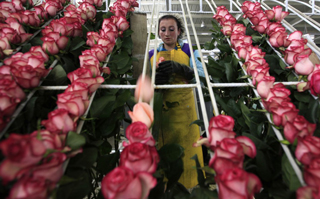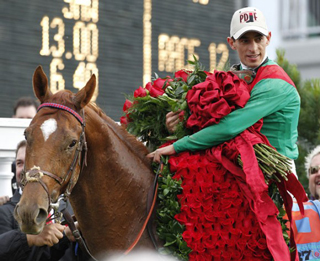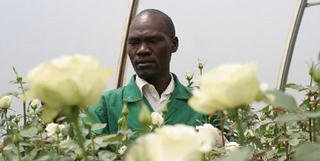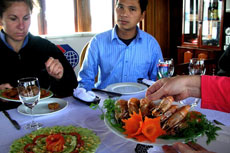Human Flower Project
Cut-Flower Trade
Wednesday, May 16, 2012
Colombian Flowers: Duty-Free Again
The new Free Trade Agreement between the U.S. and Colombia went into effect yesterday. Colombian flowers are that country’s major export to the U.S. and have gobbled up the U.S. market since the early 1990s.

Sizing and sorting roses: a worker at Elite greenhouse in Facatativa, Colombia.
Photo: Reuters
Interest in locally grown U.S. flowers is swelling into advocacy, “the 50-mile bouquet” gaining the moral high ground from organics (though many a producer who grows for nearby markets uses organic methods, too).
Meanwhile, the machineries of global government and big business roar ahead.
Yesterday, a shipment of 4,200 boxes filled with 1.2 million Colombian flowers arrived at Miami International Airport duty free. On May 15 the new Free Trade Agreement between the U.S. and Colombia, a deal 12 years in the making, went into effect, and Colombia’s first export was a cargo plane of blooms from nine megafarms.
Colombian flowers had already “enjoy[ed] preferential tariffs” in the U.S. – part of a 20-year strategy to divert Colombian growers from coca production. Augusto Solano, president of the Association of Colombian Flower Exporters, said that U.S. market now receives 76% of its exports.
But Miami Herald writer Mimi Whitefield explains that deal “lapsed last year just before Valentine’s Day and wasn’t renewed until October [2011]. In the meantime, Miami flower importers had to pay tariffs on flowers imported from Colombia and Ecuador, resulting in an extra $2.5 million a month in duties.”
Friday, May 04, 2012
Hold onto the Moment
Silver trophies are a cinch, but what if your moment of triumph is crowned with flowers? A Danville, Kentucky, florist has a high-tech solution.

Jockey John Velazquez and 2011 Derby winner Animal Kingdom wearing his wreath of roses.
Photo: WDTN
Tomorrow they’ll run the 138th Kentucky Derby in Louisville with great fanfare and millions of dollars on the line (but let’s hope, not the life of a thoroughbred racehorse as in 2008).
Called “the greatest two minutes in sports,” the Derby in Louisville now stretches to more than two weeks of festivity, and for breeders and trainers, preparing a three-year-old for the event can involve a lifetime of experience, investment and, of course luck.
No wonder winners want to hang onto the wreath of roses, the floral mantle every Derby winner gets to wear after the race.
Greg Kocher of the Lexington Herald-Leader wrote a good feature article on Molly’s Flowers and Things, a Danville flower shop that has been freeze drying floral trophies and other mementos for nearly 20 years. Her first client from the world of racing was W.T. Young. The owner of Overbrook Farm outside Lexington had Molly Jacobus “preserve the white carnations that Tabasco Cat took at the Belmont Stakes.” Two years later, when his horse Grindstone won the Derby, Young hired Molly to preserve the wreath of roses. Many of the winning owners since have done the same.
Thursday, February 02, 2012
HFQ #11: A Freight Forwarder?
Transporting plants internationally takes special expertise. Can anyone help this farmer in Austria find a “travel agent” for sweet potato slips?

Do you know of a reliable freight forwarder with experience handling plants?
A reader in Austria writes:
“We are a family farm in Austria, trying to import young specialty plants from the U.S. for a farm-trial this year (ipomoea batatas ‘slips’; 2 or 3 palletts (450kg each), in May 2012, to be specific).
“The nursery in the US producing them for us has no experience in overseas shipping and could not find any freight forwarder willing to take on the shipment… they all claim they categorically “don’t do plants,” the nursery tells us. Neither have I found any freight forwarder this side of the Atlantic interested/willing to do this, much to my chagrin.
“Therefore, may I ask if you could maybe recommend a freight forwarder, specializing in plant-transport? Or, would you happen to know a possible source/weblink for such freight
companies?
“Thank you so very much, any help is very appreciated.”
Monday, September 05, 2011
Making $39 a Month?
There oughta be law against paying cut-flower workers (or anybody) just $39 a month. Naivasha’s MP has proposed to up their minimum wage. Leaders of the Kenyan industry are pushing back, hard.

A worker in Kenya’s $21 million cut flower industry
Photo: Business Daily
Do the cut-flower workers of Kenya deserve to make $100 A MONTH?
John Mututho, Member of Parliament from Naivasha, where the nation’s biggest flower farms are clustered, thinks so. And that would be a big pay raise! Mututho has introduced an amendment to the Labour Institutions Act that would increase flower workers’ monthly wages from the current 3,765 Kenya Shillings ($39.71) to Sh 10,050 (the equivalent of $106.01).
The Kenya Flower Council is lobbying Parliament, meanwhile, to prevent legislative authority over minimum wages, in other words, to keep wages down.

